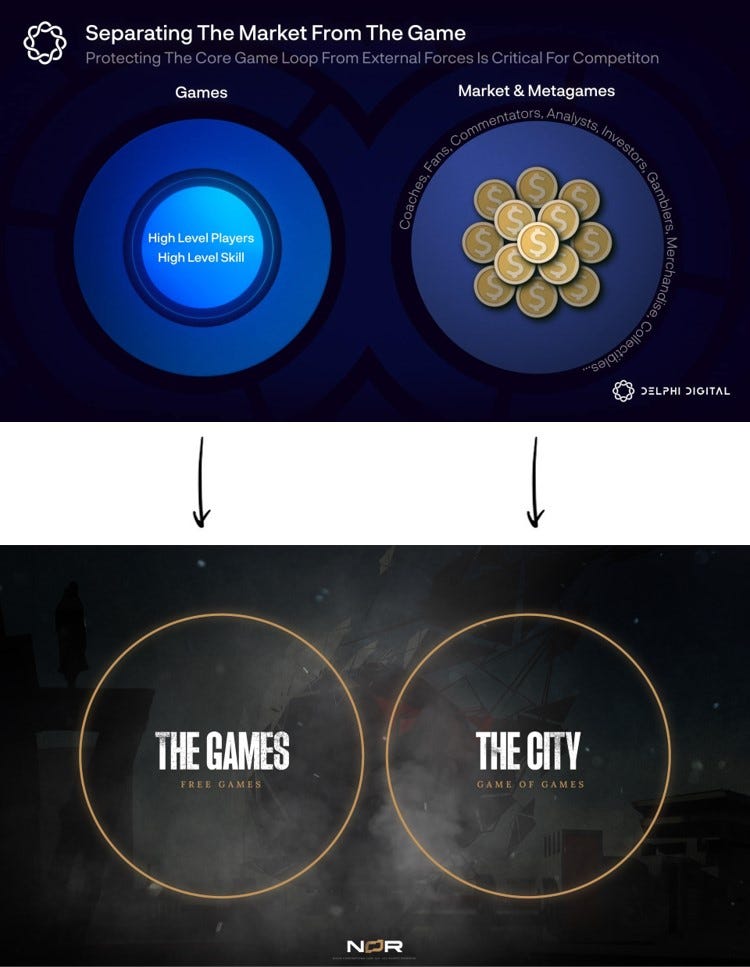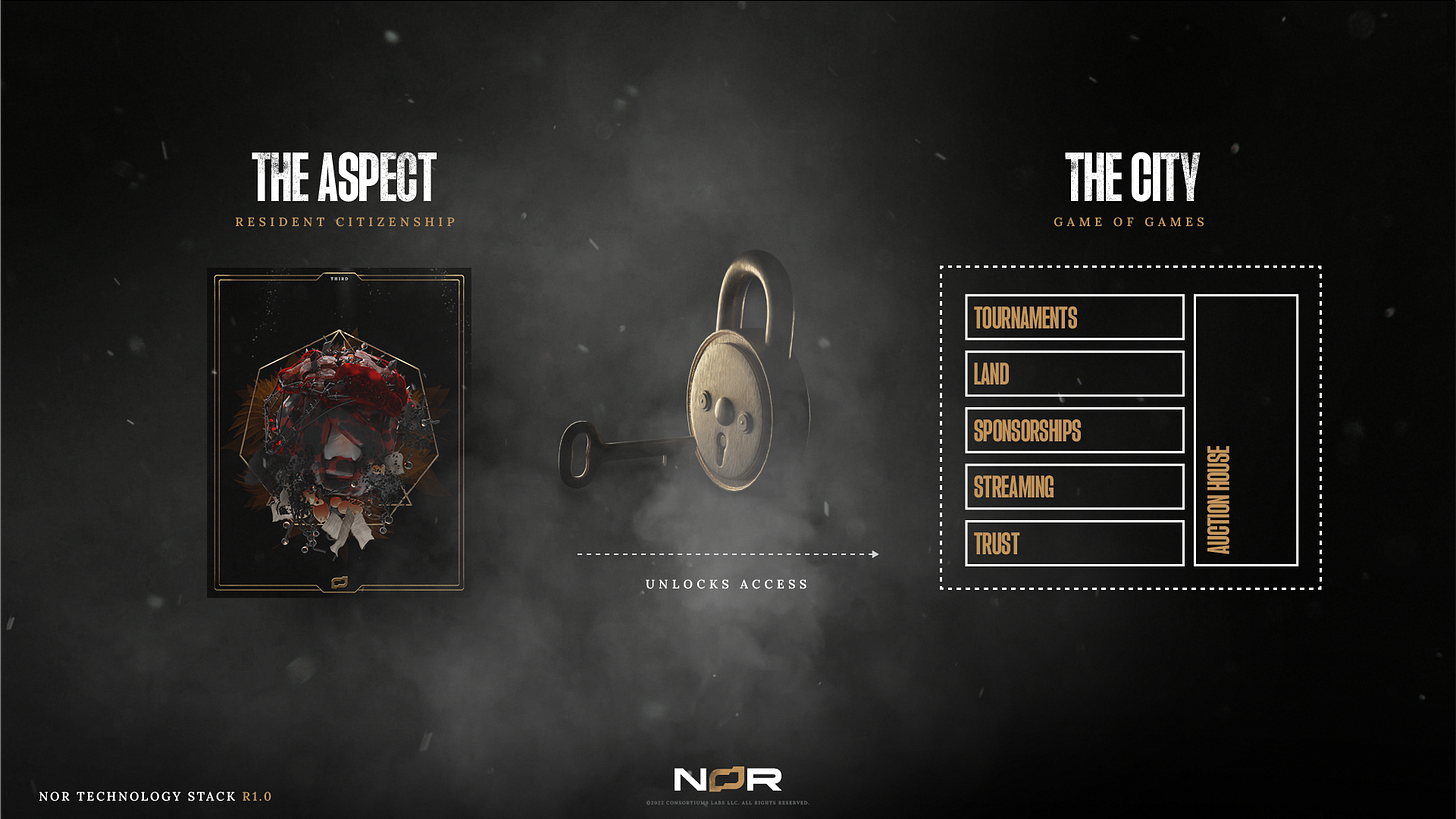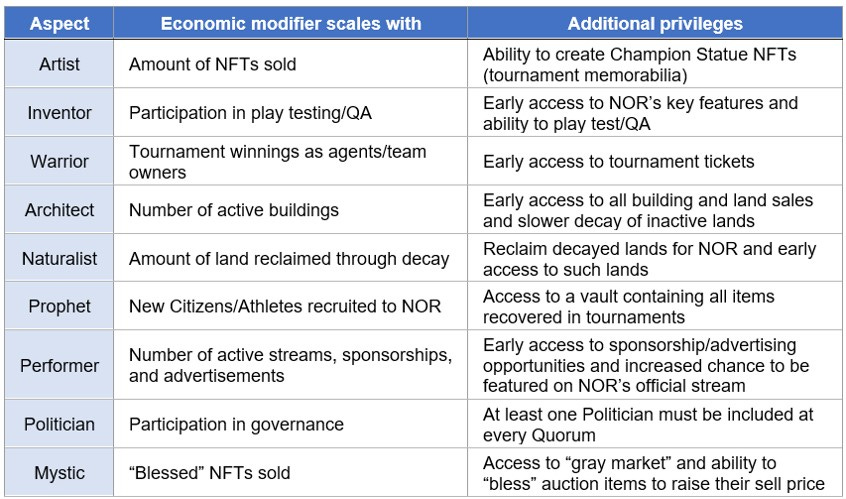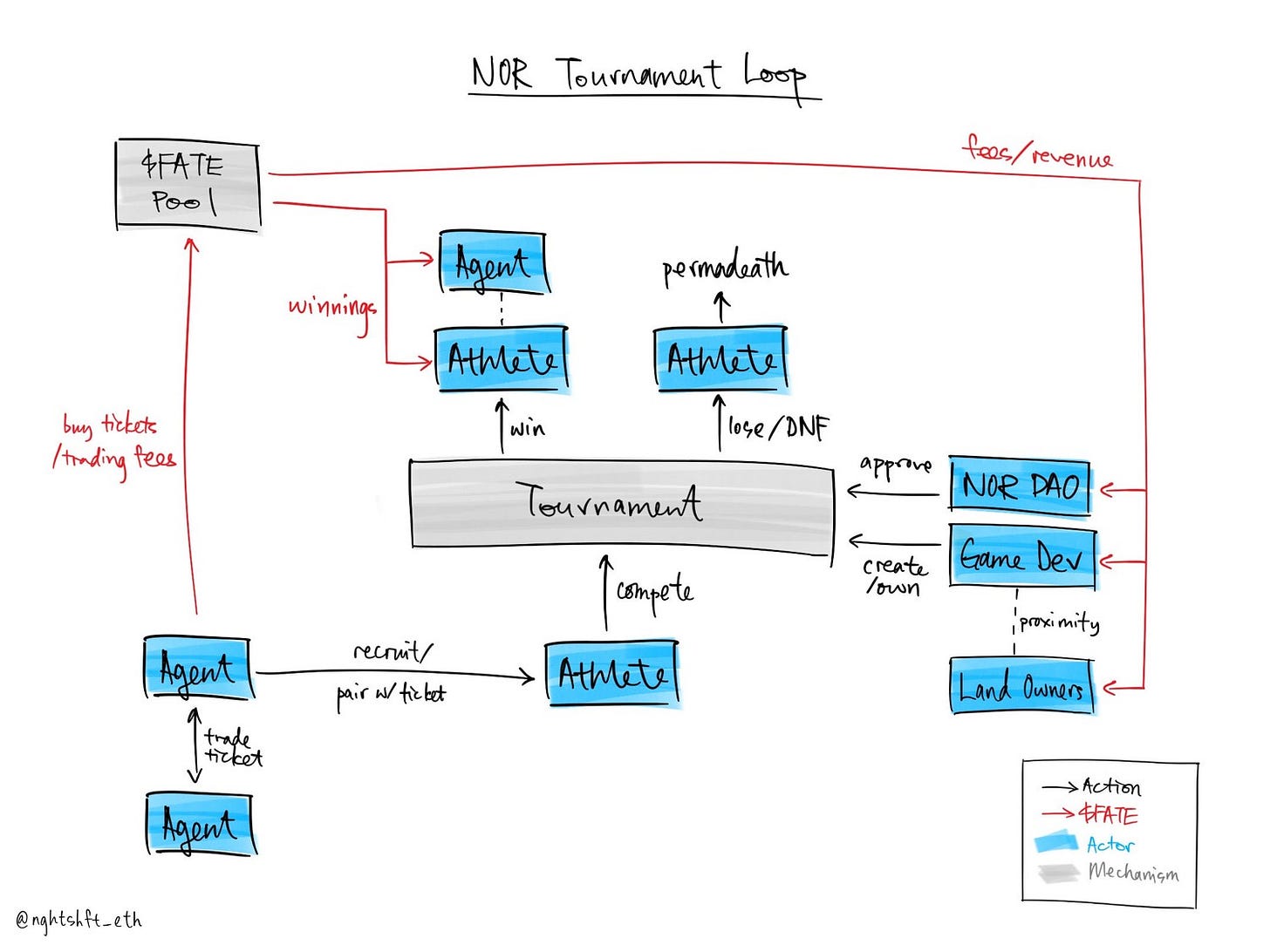NOR Deep Dive
The new regime of PlayFi
I write about web3 economics, mostly related to gaming. Follow me on Twitter @nghtshft_eth or subscribe here:
Introduction
Web3 gaming exploded in popularity in 2021, only to quickly decline due to an unsustainable Play-to-Earn economic model. Developers are now turning their attention to crafting enjoyable games and exploring new economic design options for long-term success. Among the upcoming projects, NOR stands out as particularly promising.
NOR is a gaming platform developed by Consortium9 Labs (“C9”), founded by Brooks Brown. NOR proposes a new game economy model called “PlayFi,” which separates monetization from the core game. NOR also introduces other novel economy design concepts, such as economic cycles, a utility token dynamically backed by $USDC, implicit land value tax and sortition-based governance. NOR’s platform alpha is set to launch in Q4 2023.
This article examines the whitepaper, summarizing each component of the ecosystem and focusing on its economic elements. My opinions, presented in code block format, are included where applicable.
PlayFi
Brooks considers that intertwining money with game elements, as is common among F2P (pay-to-win) and P2E games, harm the core experience and reduce players’ enjoyment and depth of play.
NOR proposes a new game economy model, "PlayFi," to fix this problem. The model ensures that core game play is free and monetization is layered around it as metagames. In an analogy to soccer, playing soccer is free, while full fledged businesses are built around the sport in the form of pro leagues, media rights and stadium ownerships.
PlayFi has a sound philosophy. Financialization is inevitable in web3 gaming with digital property rights as the foundation. By separating gameplay and monetization, whales can get involved (and game developers can benefit) without making the game unfairly favorable to those who pay.
0xKepler talked about the benefits of crypto as the metagame:
"While the crypto metagame will bring in new player types, it also helps to explicitly differentiate the current divide seen in F2P games. Whales play a different game than the rest of the players, aimed at optimizing numbers. Separating these could be a first step towards making games less exploitative, without regular players serving as content for a few whales."The Games
Games are the foundation of the NOR platform and the cores that spawn all the derivative monetization metagames. NOR will house games developed by C9 and other game developers.
All games in NOR will embrace nine fundamental principles:
Every Game is free and funded entirely by the participants’ (“Citizens”) active participation in The City.
No Game will offer microtransactions, loot boxes, paywalls, “special” items, or purchase pathways to success. Not now, not ever.
Every Game is fair. Skill is the key to success and skill cannot be bought or sold.
Every Game is easy to learn and hard to master.
All players (“Athletes”) are free to play without the risk of death or permanence.
Tournaments are exclusively for Athletes who choose to risk permanent death in high-stakes versions of our Games. Death is permanent in Tournaments.
Every Tournament is emergently filled with top-tier Athletes recruited during Seasonal play. Recruitment is the exclusive right of Citizens.
Every Game developed by C9 will use KILLIAN, our toolset of systemic movement and procedural elements developed specifically for NOR. Any developer on our platform can use KILLIAN to build their game. This allows Athletes’ core competencies to reach across all games on NOR, affording them the opportunity to “multi-sport” while freeing developers to focus on game design.
No Athlete’s stats or ranking will be shared without that Athlete’s action. Athletes always control their own data.
NOR’s first game will be a parkour racing game, developed by C9. More details will be reviewed in Q2 2023.
The City - Monetization Metagames
The City is the monetization metagame layer of the PlayFi model. It is a visualized economy of NOR, analogous to a professional sports ecosystem in the sports (e.g. soccer) world.
Currently, monetization loops include:
Tournaments
Player agency and team ownership
Land NFT
Streaming and broadcasting rights for games and tournaments
Advertising and sponsorship
Merchandising
NFT trading
Players who wish to participate in the monetization metagames are required to own an NFT called “The Aspect of the Nine.” The Aspect NFT also unlock access to the NOR P2P marketplace and governance.
The Aspect of the Nine - Access-gating NFTs
The Aspect of the Nine is a set of NFTs that grants players access to the monetization metagames.
By activating their Aspect NFT in their wallet ("Vault"), a player unlocks access to participation in the economy, peer-to-peer trading and governance. Nonetheless, players must deactivate the Aspect NFT to become an “Athlete” and compete in tournaments; only one NFT may be associated with a single account.
Aspect NFTs are split into nine different "Aspects," which provide unique modifiers to holders' rights in The City's economy:
Each Aspect NFT has various visual attributes, such as background, foreground and other graphical elements. These attributes influence secondary interactions and characteristics of the NFT holder, with more details to be released.
Aspect NFTs are structured by generations. Earlier generations are given higher priority access to and more influence in The City. The first generation consists of nine 1 of 1 “First Aspect of the Nine” NFTs and is held by NOR/C9 team.
81 Second Aspect of the Nine and 729 Third Aspect of the Nine NFTs have been released to-date. Subsequent generations will contain progressively more NFTs (e.g. 6,561 for Fourth, 59,049 for Fifth) and be released through multiple drops per generation.
The nine classes of Aspects, with a limit of one per account, form a great design that fosters a metagame based on specialization and tradeoff. As the meta evolves, such specialization can further spawn social coordination and other complex trading strategies.Tournaments
In NOR, games are free to play without risk. Tournaments are the financialized version of gameplay that take place in The City, where ticketed entry is required and death can be permanent for the chance of token winnings.
Setup
Game developers and studios create tournaments around their games via NOR’s developer portal, and the NOR DAO approves them. Various tournaments formats (e.g. ladder matches, free-for-all, best of 10, round robin, etc.) and parameters (e.g. duration, athlete eligibility, ticket price, rewards, etc.) will be supported.
Tournament tickets are restricted to Citizens (owners of Aspect NFTs), who will become “Agents" responsible for recruiting and pairing up with Athletes. The Agent and Athlete negotiate on a reward split before the tournament ticket is minted as NFT to both the agent (tradeable) and athlete (non-tradeable).
Permadeath
If an athlete loses during a final round permadeath tournament or failed to compete in a tournament they opted-in to, their account NFT is burnt and lost forever. This means they lose access to all progress across all NOR games and access to any of their in-game items.
Economics
The ticket prices for NOR tournaments are set in FATE by the game developer. These tickets can be made free, in which case the developer will pay out the FATE following the tournament.
Proceeds from ticket sales and trading fees will be split between NOR DAO, the prize pool for the winning agent and athlete, the developer and eligible land NFT owners.
Permadeath (Dave Stanton calls it “Play-to-Die”) is a great way to increase the stakes of a game, adding meaningfulness and excitement to the experience for both players and spectators.
The underlying belief is that the feeling of true risk enhances people’s emotional attachment. The more people care about the game, the higher the entertainment value and more they are willing to spend money and attention on metagames. It creates a positive feedback loop between competition in the core game and economy size of the metagames.
Additionally, permadeath acts as an organic sink for game assets, scaling dynamically with the game’s traction. As Richard Kim stated, PvP destruction is the ultimate sink for sustainable in-game economies.
Obviously, the implementation is easier said than done. The rate of asset destruction needs to be balanced carefully as the player base and competition cadence fluctuate. Same with the destruction of player accounts. When done properly, the mechanics can drive value into re-progression; conversely, it could lead to players becoming discouraged and churning.Land
Land NFTs in NOR mirror the economic models of real-world stadiums and their effects on the surrounding economies.
Land is divided into a finite amount of parcels and arranged in circles around the “Arena Perilous.” Every game has its own "Stadium" controlled by the game developer and scattered around the map.
Land NFT owners may gain a share of the tournament winnings, depending on their proximity to the stadiums. In order to qualify for this revenue, land owners must take part in NOR's economy, such as through governance, building, trading, streaming, etc. Conversely, those who fail to do so will face land decay and ultimately see their land returned to the City.
Land placement is reset at the start of each Eternal Return (economic cycle), giving land owners an opportunity to redeploy to a new location. Discord discussions with the NOR team indicates that this redeployment process may involve trading with others or paying to upgrade.
One way land owners may gain active stewardship and qualify for land revenue is by building on their land. Each building type also provides privileges for specific economic activities:
Team headquarters: Land owners can own a team, purchase sponsorships and tickets for team tournament
Broadcast towers: Land owners can bid for exclusive broadcast and streaming rights, which can then be monetized
Additional buildings: Details to be revealed
More details on land will be released prior to NOR’s initial land sale in 2023.
Location-based land economies have been met with mixed reactions in gaming, as they can lead to rent-seeking behaviors and inefficient asset utilization. NOR is attempting to combat this by introducing land value tax, implicitly through land stewardship requirements and inactive land decay/recall.
While I find the requirements of maintaining land stewardship to be lax (e.g. simply paying for a building), this is an encouraging development and may serve as a useful case study for other virtual land projects.The Auction House - Marketplace
In NOR, game items like vanity items, tournament merch, game artifacts, awards and Athlete highlight reels are initially stored off-chain. At the end of each season, players have the option to mint the items into NFTs.
Non-game items like tickets, Aspects, land, and streaming/sponsorship rights are also NFTs.
All NFTs in the NOR ecosystem can be traded on “The Auction House”, a proprietary marketplace. The DAO charges a 9% fee on trades and all Citizens must complete KYC verification to participate.
Streaming, Advertising and Sponsorship
NOR sells streaming rights to Citizens, in the form of stream key and dynamic stream URL for use with popular streaming services. Citizens can stream games, but to stream tournaments, they must possess a land NFT and own a broadcast tower. In return, they may share a portion of tournament ad revenue or pursue their own advertising opportunities.
NOR is building an “advertising network designed specifically for the metaverse.” Its games feature native ads on in-game billboards, posters, loading screens and stream watermarks, with the goal of creating a metaverse-specific ad network that will not impact player performance.
Sponsorship in NOR works similarly to esports and pro sports, with partners' placements across uniforms, tournaments and stadiums per season.
FATE Token & Economic Cycles
NOR's economy encourages utility and active participation and penalizes rent-seeking behaviors. It is powered by the FATE token, which will be used for all transactions.
Initially, FATE is backed by USDC at a 1:1 ratio. When players buy products from NOR through FATE, the platform will recycle and re-sell this FATE to new players. The sale proceeds are used to increase the backing ratio of FATE. Periodically, FATE will be exchanged for USDC and distributed to token holders.
The economy also features a built-in economic cycle system, "Eternal Return”. The length of each cycle is determined by NOR and tends to extend over multiple game seasons. At the conclusion of each cycle, the state of play is reset and players start anew in the following cycle.
Start of a cycle
A fixed amount of FATE is made available, backed 1:1 by USDC.
Every citizen is granted a percentage of the total FATE pool, depending on their Aspect and Land NFTs (closeness to the centre and stadiums) and how well they fared in the previous cycle.
Land placement is reset, giving land owners an opportunity to redeploy to different locations.
During a cycle
Players may take part as Citizens, who participate in economic functions, or as Athletes, who compete in competitions, to earn and accumulate FATE.
NOR participates in the economy by selling products, such as vanity items and streaming rights, to players. It puts the earned FATE back into circulation via token sale and use the proceeds to bolster the USDC backing.
End of a cycle
At the end of each cycle, players will be given notice and must prepare. Items not stored in the Vault (wallet) may be destroyed.
Citizens will be rewarded in USDC for the FATE they earned and stored in their Vaults. All FATE outside of NOR platform will be destroyed.
The Auction House will close and peer-to-peer trading will be paused until the next cycle begins.
NOR’s token economics is subject to change. As of now, FATE has a total supply of 10B token and an initial circulating supply of 100M. When new games are added to the City, extra FATE will be released into the economy.
The Eternal Return is a novel gaming concept, allowing NOR to adjust their economy design and mechanisms without permanently damaging players. It also offers a greater variety of metagames for players to learn and master across cycles.
Yet, issues remain with the conversion of FATE to USDC. The whitepaper indicates that such conversion happens at the end of every Eternal Return, while Discord discussions with the NOR team suggest that conversion won’t happen “until tokens are backed at minimum 2:1 but more than likely 3:1 or more.”
This presents another problem. If the backing ratio reaches 3:1, implying a 200% (hyper)inflation within a cycle that presumably lasts a few months, players may be incentivized to hoard FATE and the token will lose its utility as a medium of exchange.
Capital sources for USDC backing in each Eternal Return are another point of contention. NOR will supply the necessary USDC in the first cycle. For subsequent cycles, it is inefficient for NOR to continue doing so. Alternately, only excess USDC above 1:1 backing ratio may be distributed to FATE holders, with the remainder used as the backing for a new cycle. This, however, may create a security-like situation, where the distribution resembles a dividend.
While there are open questions to NOR’s economy design, it is encouraging that NOR is communicating with the community and actively thinking through these matters as they finalize their design.Governance
NOR will be governed by a sortition system. Citizens who have completed KYC will be randomly chosen to form "Quorums" that vote on individual or groups of policies. Quorum members will be rewarded a share of NOR's economy for their participation.
To ensure the integrity of the governance system, voting data will be made public, while the identities of Quorum Members will remain anonymous until after the review and voting process to ensure the integrity of the system.
Governance process
Policies: Any Citizen can propose platform changes
Policy Quorum: Reviews all new policies; pass/deny policies to be sent for voting
Immortal Quorum: Review and vote on passed policies from Policy Quorum
Review Quorum: Consists of Land and Politician Aspect owners; final vote on passed policies (yes/no/revise) from Immortal Quorum
The Nine: Controlled by NOR/C9; ability to veto policies
Technology
NOR has yet to release details regarding the blockchain layer of their platform, but more information is expected to be out later in the year. The web3 layer will support smart contracts, Resident Vaults (wallets), NFTs and the FATE token.
The rest of the platform will be powered by web2 technologies, such as game server and data infrastructure, AWS, and other front-end/back-end deployment tech.
Team & Investors
NOR is developed by Consortium9 Labs, which was founded and is led by Brooks Brown. Brown is a pioneer in VR and has previously led interactive content development at Lucasfilm, LucasArts, Lightstorm Entertainment, Universal Pictures, and James Cameron’s AVATAR quadrilogy.
The C9 team has diverse experiences at gaming and media giants, including Activision Blizzard, EA, Disney, Niantic, Google and Apple.
The team is backed by prominent web3 investors, like Framework Ventures, Arca, Bitkraft Ventures, Delphi Ventures, Tribe Capital, Mechanism Capital.
Roadmap
NOR aims to launch its platform alpha in Q4 2023, with signups for Aspect NFT owners opening in Q3 2023. Beta launch is planned for Q1 2024.
NOR has sold out two NFT collections, including the Second and Third Aspects of the Nine. It plans to release the Fourth Aspect of the Nine in Q3 2023 and Land NFT pre-sale in Q1 2024.
Final Thoughts
NOR is built on the foundation of PlayFi, which emphasizes play over monetization. Its innovative economy creates monetization loops separated from the core game, and metagames that encourage utility and active participation.
More importantly, the NOR/C9 team actively seeks community feedback to inform and perfect its economy design. With an accomplished yet modest team, top investors and an engaging community, it is exciting to see what NOR will bring to the web3 gaming industry.
Additional Reading
Whitepaper | NOR
The Future of (Crypto) Gaming | Delphi Digital
Disclaimer: This content is for informational purposes only. It is not a recommendation to purchase tokens or any other assets. Any investments made in the projects or assets mentioned below are done so at your own risk. This is not financial advice.






